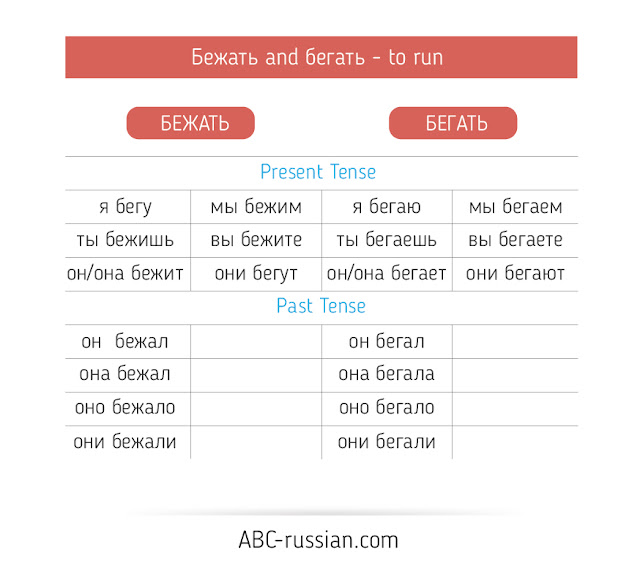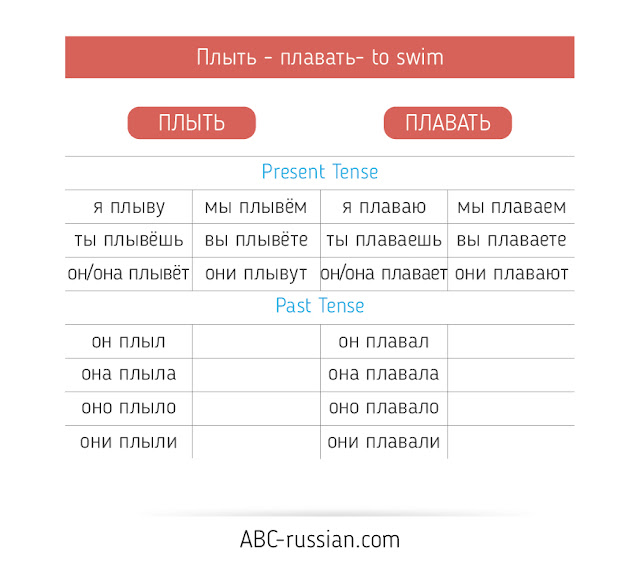
Russian verbs of motion denote various types of moving (walking, flying, driving, running, swimming, taking etc.)
The most popular Russian verbs of motion you can find here. You can easily download this table and use it in your studies.
You should remember that all Russian verbs of motion go in pairs: unidirectional and multidirectional.
How to use different types of these verbs you can find in my post: Russian Verbs of Motion. Part 2 and there you can also easily download the table of it’s usage.
Conjugation of Russian verbs of motion in Present and Past tenses
Here you will find conjugation of all popular Russian verbs of motion in Present and Past tenses.

- Сейчас я иду в университет.
- Каждое утро Анна ходит в спортзал.
There are lot of idiomatic expressions with this popular Russian verb.
1) Asnwering the question "How are you?"
Как дела? Дела идут хорошо/плохо. things are going well/badly
2) Speaking about weather.
Дождь идёт
3) Speaking about transport
Автобус идёт.
4) Speaking about life. Life goes on.
Жизнь идёт.
5) Speaking about time.
Время идёт. (бежит/летит)
6) Speaking about lesson, film, workshop etc.- everything that is in progress now.
- В кинотеатрах идёт интересный фильм.
- Тише! Идёт урок!
- В январе в Москве пройдёт серия мастер классов по вязанию крючком.

- Маша ездит на работу на метро.
- Сейчас я еду домой.

To fly.
- Я боюсь летать на самолёте.
- Птицы летают высоко в небе.

- Я бегаю по утрам в парке.
- Котёнок испугался и убежал.

This Russian verb of motion usually translated into English as: to drag, to trail, to pull, it denotes to pull somebody/something along with effort and difficulty.
- Мне пришлось самой тащить эту тяжёлую сумку.
- Если кто-либо таскает что-либо, то это означает, что этот человек
переносит что-либо тяжёлое в руках, на спине и т. д. - Таскать камни,
брёвна, корзины.

- Ветер гонит тучи.
- Гнать сломя голову.

To roll, to drive, to wheel, to turn over and over and move in a particular direction; to make a round object do this.
- Катить мяч.
- Катить велосипед.

To climb, to penetrate, to reach into, to go into or through something with difficulties.
- Ночью воры разбили окно и залезли в магазин.
- Кошка быстро залезла на дерево.

- Когда ребенок начинает ползать?
- Рождённый ползать летать не может.

- Антон долго бродил по улицам.
- Грибники заблудились и всю ночь бродили по лесу.

- Лодка плывёт к берегу.
- Я хорошо плаваю.

To carry on foot, to take somebody/something from one place to another. To wear clothes.
Remember that this verb is transitive (+ noun in Acc.)
- Я несу книги в библиотеку.
- Мальчик несёт портфель.
- Мне не нравится носить шапку.

To carry by vehicle. ( This is the main difference between нести and везти: to carry on foot and to carry by vehicle)
This verb is also transitive, that means it requires noun in Accusative case after it.
1) an action when a person is driving another one;
- Дедушка каждый день возит внуков в школу.
- Завтра машина привезёт новую мебель.
2) an action when a person is walking and pushing or pulling the vehicle;
- Женщина везёт коляску.
- Мальчик везёт велосипед.
3) to drive a car
- Иван пошёл в автошколу чтобы научиться водить машину и получить права.
- Я давно за рулём и хорошо вожу машину.

The meaning is: 1) to lead, to take on foot
(both the subject and direct object of this verb must refer only to living beings)
- Родители ведут ребёнка в школу.
- Я каждый вечер вожу собаку на прогулку в парк.
2) to run a course, to give classes
- Этот курс ведёт профессор Иванкин.
- Завтра Мария будет вести занятия для старших классов.
3) to behave oneself well/badly
- Дети, которые хорошо себя ведут, обычно получают более высокие оценки.
- Это целое искусство - знать как себя вести в высшем обществе.
I hope that help you to make Russian language and Russian verbs easier.
Feel free to leave comments in the comment box. Thank you. Спасибо!
No comments :
Post a Comment